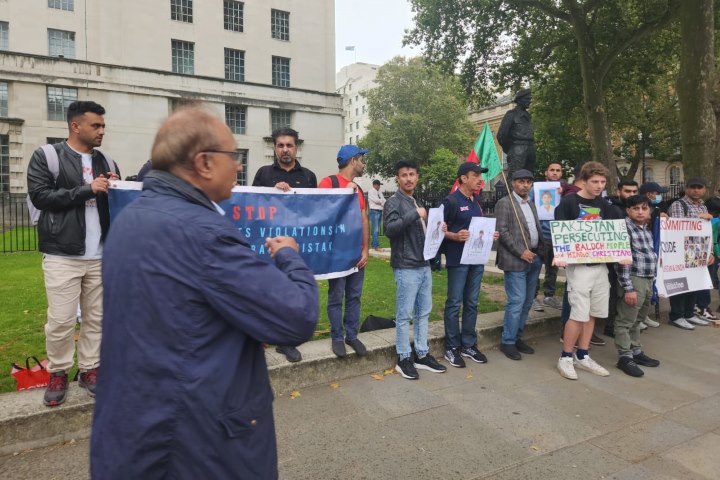

General Secretary of the World Sindhi Congress Dr Lakhu Luhano
The last few days have seen unprecedented protests by beleaguered Sindhi Hindus over the kidnappings of dozens of hostages by bandits. The protests happened over several days in numerous towns and cities including Karachi, Kandhkot, Larkana and Kashmore regions after the police did not make efforts to trace dozens of people kidnapped by criminals.
Protesters even called for army intervention in a region where Hindu girls have been targeted systematically for forced conversions and Hindu businessmen are kidnapped for ransom. The demonstrators included social and human rights organisations, Hindu traders and businessmen who blocked the highways going to Punjab and Balochistan.
The UK and USA-based World Sindhi Congress (WSC) issued a statement condemning the systemic violence and atrocities perpetrated against vulnerable Sindhis, especially Sindhi Hindus.
The WSC said: “Although violence against Sindhi Hindus has been a dark thread in Pakistan’s history—forcing approximately 80 per cent of them to flee their ancestral homeland since the nation’s inception—recent years have witnessed an alarming escalation. Sindhi Hindus now face multi-faceted, state-sanctioned attacks. This includes forced conversions of minor girls, desecration of places of worship, and abductions carried out by bandit gangs. These abductions range across all age groups, from children as young as four to individuals over 60. Heart-wrenching videos of chained and tortured victims are being disseminated on social media platforms, deepening the community’s trauma”.
In an exclusive interview with India Narrative, Dr Lakhu Luhano of the WSC said that the creation of Pakistan continues to be a dark night for its minorities which has continued for the last 76 years. “The Sindhi and Baloch people have suffered crimes against humanity and are now facing a genocide and elimination by the State. In Pakistan, there is no concern for historical nations and for the people. The conditions of people are worsening and people are dying because of hunger and malnutrition because their resources are taken”.
To a question on the atrocities on Hindu and Christian girls, Luhano said that these [crimes] are sponsored by the State and these are carried out by proxies, “because the minorities are the most vulnerable part of our society. They want to marginalise them [Hindus] and coerce them so that they should leave their motherland of thousands of years. It is sponsored by the state – it is a state policy to convert the minorities.
On a question whether the Pakistan government has made efforts to find solutions to the problems of the Sindhis, Lohano said: “They will not find solutions because there is a saying – ‘if the horse makes friendship with grass then what will the horse eat’. Therefore they are taking away our resources and they continue that control with force, with violence and with extremism. So, why should one expect that they will talk to us”.
Luhano said that one of solutions to end the human rights violations against minorities is through the right to self-determination. “The Baloch and Sindhi people should be given the right to determine their destiny, the right to determine their governance and the right to their resources”, Luhano said. He added that the fight for dignity can include communities from Khyber Pakhtunkhwa, Gilgit Baltistan and even Pakistan Occupied Kashmir (POK) where people are suffering at the hands of the Pakistani State. “There are saner elements who believe in human dignity and they are supporting our struggle”, he added.
Israel Defence Forces Spokesperson Brigadier General Effie Defrin on Thursday said that Iran has expressed…
India's Hindustan Aeronautics Limited (HAL) and French engine manufacturer, Safran Aircraft Engines, signed an agreement…
India has emerged as a country with the third-largest growth in power generation capacity globally…
Prime Minister Narendra Modi hailed Indian chess grandmaster Divya Deshmukh for defeating world number one…
The family of detained Baloch leader Mahrang Baloch has accused prison authorities at Quetta's Hudda…
The QS World University 2026 Rankings bring great news for our education sector, as the…